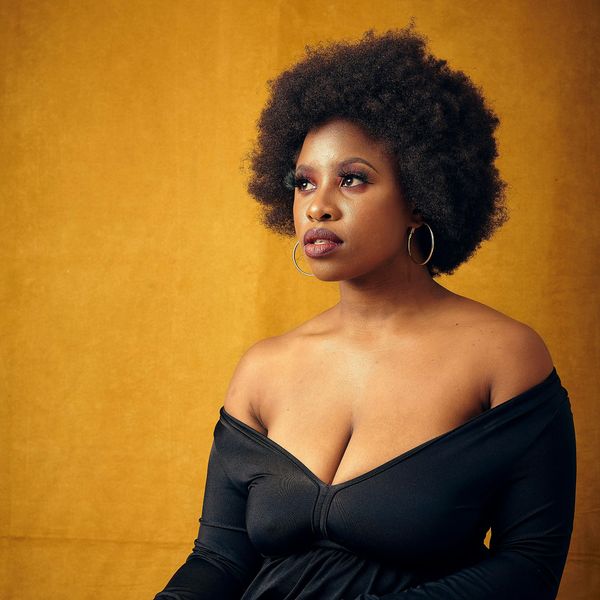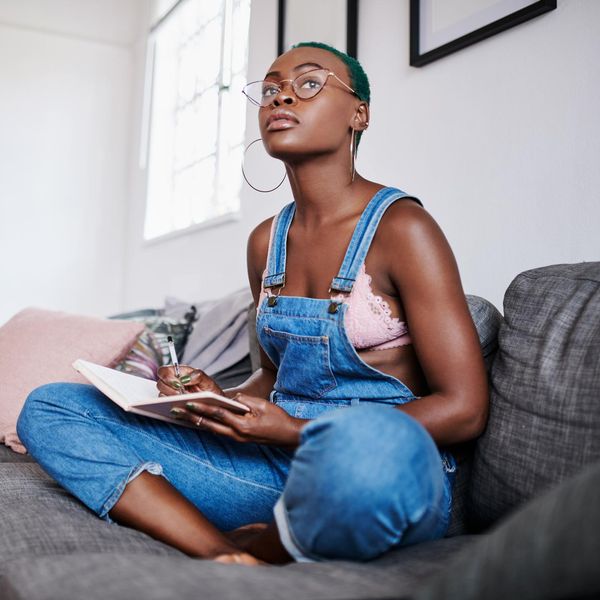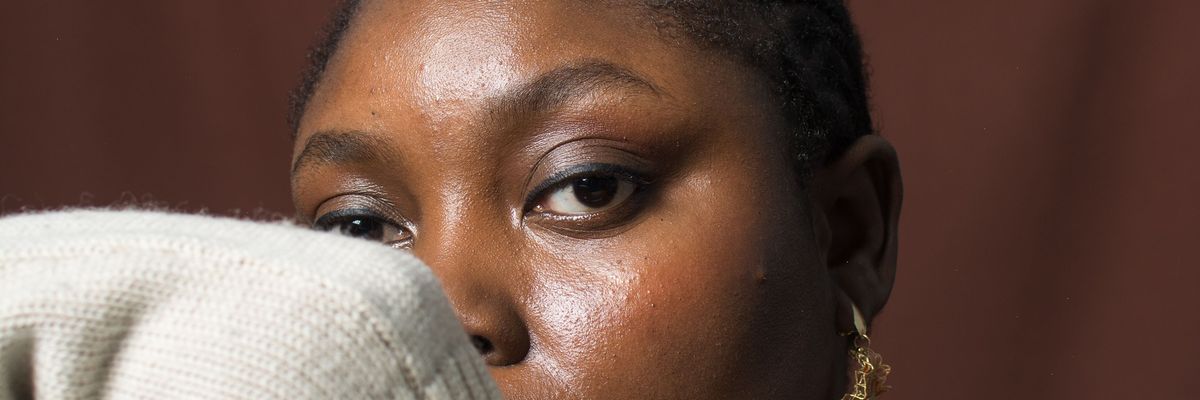
As someone who pretty much makes a living out of sharing all of the things that I've learned about relationships, if there's a consistent thread that ran through pretty much all of my dysfunctional ones, it's the fact that, at the foundation of each and every one of them, I didn't trust myself very much—even before they started. The reason why I didn't trust myself is because I didn't take out the time to really get to know me and my wants and needs before attempting to get to know other people.
Most of us would agree that trust is a core principle for all healthy connections, whether they are personal or professional. When you trust someone, it means that you are confident in their character and integrity. It means that you know they are reliable. When you trust another person, it means that, if anyone is gonna say what they mean and mean what they say, they are the one individual that you don't have to worry about; if anyone can be depended upon to have your back, they are it.
Unfortunately, a lot of us put this kind of confidence in the wrong people because confidence does not lie within us first. We don't trust our own judgment. Our gut instincts. Shoot, we barely even trust what our mind, body and spirit tell us that we need (especially over what our appetite tells us that we want). Unfortunately, the fallout of all of this is that, when you don't trust yourself, you can end up trusting the epitome of the wrong kinds of people. You can also end up making some pretty bad decisions too. And the fallout of all of this is you end up distrusting yourself…even more.
I know this isn't a topic that's discussed nearly as much as it should be. So, in the effort to make sure that you trust you before anyone or anything else, I've provided a few signs that you probably have trouble trusting yourself, followed by three ways to break free from that totally counterproductive mold.
You Can’t Make Decisions Without an Entire Tribe in Tow
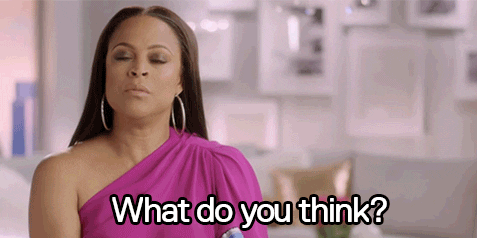
Accountability is a good thing. More of us could stand to apply it our lives far more often, to tell you the truth. But it's one thing to be open to having people reel you back in or call you out on your ish; it's another matter entirely if you're mentally and emotionally paralyzed without 5-7 of your friends helping you to make a decision.
A lot of times, if a person requires an audience in order to make choices in life, it's because they want others to like what they are (or aren't) doing. They are so consumed by that, their own happiness doesn't even really factor in all that much.
So yeah, if you need a bunch of people to "get", understand or co-sign on what you are—or aren't—about to do in your life, that is a very telling indication that you don't trust yourself very much; that you think the opinion of others is more important, impactful and relevant than your own. (Pretty scary, huh?)
You Flip-Flop. A LOT.
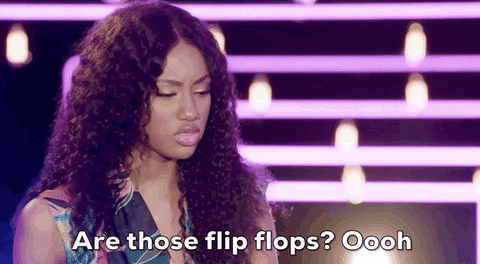
I've got a friend who I pretty much always wait until her third declaration before I take her seriously. Why? Because she's one of the biggest flip-floppers that I know. Literally, over the course of one day, she can make three different declarations and profess wholeheartedly that she means each one.
What causes someone to be like that? Typically, they are very feelings-oriented and outside-influence swayed. What I mean by that is when they are up, they are going to make a choice based on that feeling but if they feel down 10 minutes later, they are going to make another decision about the very same matter. As far as outside influences go, if they decide to do something and then they read an article about how their favorite celebrity decided to do the opposite based on a similar scenario, suddenly, they think the famous individual—someone they don't even know—probably has more wisdom and insight than they do. (Yeah, that's pretty much a crap shoot most times, if you ask me.)
The problem with being a constant flip-flopper is two-fold. First, it channels mass confusion throughout your psyche. Second, it keeps you from making real progress. After all, the definition of decision is "determination, as of a question or doubt, by making a judgment". Did you peep that? A person who makes a decision does it by being determined to do so. They aren't easily swayed once they make a judgment call. That's because they believe that what they are doing is right for them—no matter what is going on around them (or how often their feelings change because of it).
You Rarely Try New Things
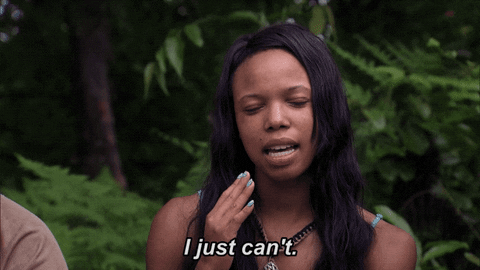
When's the last time you went to a new place, tried a new food or attempted something that was totally out of your comfort zone? If you're staring blankly at the screen because that's how long it's been for you, you've just ran into another sign that you don't trust yourself, nearly as much as you should.
Although some people probably think that sticking with the same ole' predictable patterns and routines is about "knowing oneself enough to not venture out", it's actually the opposite. A part of what it means to trust yourself is that you have a level of confidence that assures you that stepping out and doing new things is a good idea. That, no matter what happens, at the end of the day, you'll be just fine. If you don't know anything else about yourself, you are able to 100 percent trust that.
You’re a Closet Envier

Envy is evil. Straight up. It's all about being so focused on what someone else has going on that you're not able to pay attention to the good things that are happening in your own life. In fact, envy is so ridiculous that it's mentioned in the 10th Commandment (Exodus 20:17)—"Thou shall not covet." (Coveting is envying, by the way).
So, how do you know for sure that envy is something that you struggle with? You're constantly comparing yourself with others. You have a hard time being genuinely happy for people and their triumphs. You are always trying to set your life to the pace of someone else's. You think that success means outdoing someone instead of living your own best life. You are a copier. You dislike others for no real good or valid reason. In short, you're a hater.
Ugh. Just reading all of that can show just how draining envy is. It's also an enemy of your spiritual development because it can have you out here feeling like God loves someone else more than you; that He's looking out for someone else more.
Someone who trusts themselves doesn't have time for envy because they are confident in their own gifts and abilities. The end result is they are too busy creating their own glow-up to be concerned or worried about someone else's.
Your Voice Isn’t Loud Enough
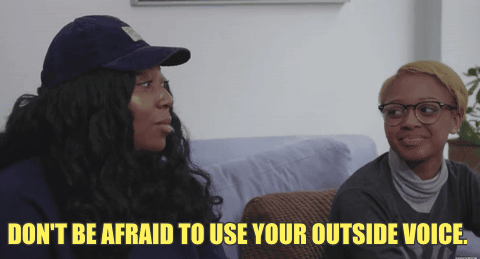
Back in the day, there was an episode of A Different World where Tisha Campbell played a student by the name of Josie who had HIV and Whoopi Goldberg played her professor. An assignment was given to the class to write their own eulogy (you can watch a clip of it here). As Josie was fidgeting to get through her presentation, which included sharing that she had HIV, Whoopi's character told her, "You are a voice in this world." She sure was because, all these years later, I still remember that scene. That's how powerful a story can be.
Above my bed, there is a quote that says, "Your story matters. Tell it." Your perspective, your experiences, your personality—there's something about all of these things that are yours and yours alone. They are what make you a rare commodity on this planet. But who's gonna know just how significant and relevant to the culture you are if you're not speaking up?
A lot of people have a hard time trusting themselves because, quite frankly, they aren't sharing enough of who they are and what they have to offer with others. You can't trust yourself if you don't believe what Josie's teacher told her—"You are a voice in this world". What are you waiting for? Speak up. (A good read on this topic is "The Power of Your Voice: 3 Steps to Finding and Embracing It".)
How to Trust Yourself—First, Take Great Risks

It's kind of weird that a lot of us are able to trust other people when we don't even trust ourselves. But when you think about those who you do put your confidence in, how did it get to the point where you felt sure that you could? You took a chance on them, right? You told them a secret and they kept it to themselves. You asked a favor and they came through. You needed them to be an ear and a source of support and they made themselves available. In short, you took a risk and they didn't disappoint.
The same way that you extended yourself to others to see if they were worthy of your trust, that is the same thing you must do in order to trust yourself more. This means you need to meet new people, attempt something that you've never done before and again, be intentional about going beyond your comfort zone, both personally as well as professionally, from time to time.
If the thought of doing this terrifies you, but you're going to try it anyway, that is already a step towards building trust and self-confidence. The cool thing about taking risks is they can open the door to new opportunities, teach you lessons about yourself and others, and prepare you for taking even greater chances in the future. As a result, fear will fade. And that's always a good thing.
Next, Develop Your Strengths
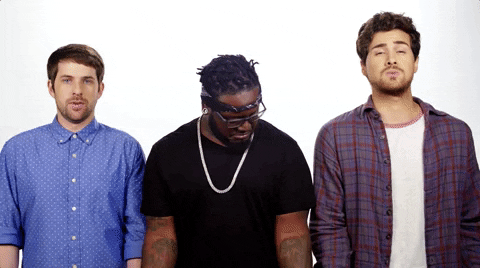
A huge mistake that a lot of us make, far too often, is we focus on our weaknesses far more than we do our strengths. But if all you do is focus on what you can't do well, you're never going to refine and perfect what you do.
A good example of this is me and my brother. I have a gift for writing; it comes effortlessly to me. Something I have the talent for is singing. My brother is the opposite. He's had great success as an artist, but if I looked at him and said, "I'm going to abandon my natural writing ability to become a better singer", while I might've gotten better, I know for a fact that I wouldn't have seen the kind of success that I have had as a writer.
Strengthening weaknesses is cool. But man, take it from me—if you put more sweat equity into further developing your strengths, you'll be unstoppable in so many ways. The trust that you have in yourself and what you can accomplish will go straight through the roof!
THEN, BE YOURSELF. UNAPOLOGETICALLY SO.
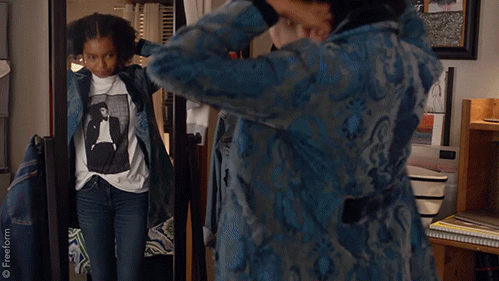
Ralph Waldo Emerson once said, "To be yourself in a world that is constantly trying to make you something else is the greatest accomplishment." He is so right. I venture to say that a lot of people are out here, totally distrusting themselves, and it's all because they are paying more attention to what society, their family and their peers are telling them to be rather than 1) pondering who God created them to be and 2) looking within to figure out the kind of person they want to be.
I can personally attest to the fact that when you're intentional about being your true and authentic self, not everyone is going to like it. A part of the reason is because genuineness is foreign to a lot of folks; it's uncomfortably different. In fact, I've got a quote by a writer named Shannon L. Alder that's the signature on one of my email accounts. It says, "Being different is a revolving door in your life where secure people enter and insecure ones exit." Say that, Shannon.
Always remember that trust is about strength, ability, sureness and integrity. If you focus on developing these things in such a way that you can be proud of yourself, what others think (or don't think) won't matter nearly as much. You'll accept that who's meant for you will enter, who isn't will exit—and both are for the best. Because life is too short and you are too special to be out here pretending to be someone else, simply to please others. You'll know, beyond the shadow of a doubt, that you've got to trust yourself enough to be completely and unapologetically yourself. And graduating to that kind of mentality will bless you tenfold!
Want more stories like this? Sign up for our newsletter here and check out the related reads below:
These Are The Things Self-Aware People Do Daily
6 Signs You Are WAY Too Self-Critical
Feature image by Unsplash
- Signs It's Time For A Major Life Change - xoNecole: Women's Interest, Love, Wellness, Beauty ›
- 8 Ways To Be Kinder To Yourself, Kind To Yourself - xoNecole: Women's Interest, Love, Wellness, Beauty ›
- 3 Ways to Develop Self-Trust ›
- Why You Can't Trust Yourself | Mark Manson ›
- 6 Tips for Building Trust in Yourself ›
- Stop Looking for Signs and Trust Yourself ›
- Why You Don't Trust Yourself - Thrive Global - Medium ›
- 5 Signs You Should Trust Yourself More (and How to Do That ... ›
- Why you do not trust yourself | Peter Shallard ›
- Don't trust me. Trust you. A guide to overcoming self-doubt. | Jason ... ›
- 13 Signs You Don't Trust Yourself, Even Though You Should ›
- 21 Signs You Don't Trust Yourself ›
Your December 2025 Monthly Horoscopes Are All About Surrender & Alignment
December is about letting go. We end the year with the need for more peace, reflection, and rejuvenation, and that is exactly what December is providing for us. The Sun is in Sagittarius, and anything is possible. This is the month to believe in that and to know that the universe is supporting you. With a Supermoon in Gemini as we begin the month as well, we have an opportunity to gain the closure we have been looking for this year and to wrap up old projects, ideas, and communication breakthroughs.
This is the month to make your peace the priority and let go of trying to control the way the tides are turning. Trust in your new beginning, and give yourself time to prepare for it this month.
A big part of the clarity that is coming through this month is due to Neptune going direct in Pisces on December 10, after being retrograde here since July. With Neptune now direct, we are able to see our inspiration and creativity a little more clearly, providing the perfect energy for dreams and manifestation to be built upon. The smoke is clearing, and it’s up to you to decide what you want to do with this newfound clarity that this transit is bringing. Mercury also moves back into Sagittarius on December 11, which is great for communication and clarity, and the adventures you were trying to see through at the beginning of November come around for you again with greater purpose and support.
On December 15, Mars enters Capricorn until the end of January 2026, and this is the extra push we need to make important changes and to be on the path towards greater abundance, stability, and prosperity. Mars in Capricorn takes care of business, and we have extra energy at our disposal during this time to do so. This transit is an ideal time to focus on your career or financial goals for next year and to start putting some of these plans into motion now. A few days later, we have the New Moon of the month, which will be in Sagittarius on December 19, and this is the perfect New Moon to manifest.
The energy is high, magic is in the air, and it’s all about moving forward with the new beginnings that are inspiring you and bringing you joy to think about right now.
Capricorn Season officially begins on December 21, and this earth sign energy is how we heal, gain closure, and build new foundations in our world. With Venus also moving into a Capricorn a few days later, there is something about peace, prosperity, and security that we are gaining in life and in love as we close out the year, and this is what we need right now. This month is about reflecting on what was, letting go of old hurt, and renewing. December is an ending and a new beginning in one, and there is magic in this space to be created.
Read for your sun and rising sign below to see what December 2025 has in store for you.
 AriesKyra Jay for xoNecole
AriesKyra Jay for xoNecoleARIES
December is a full-circle moment for you, Aries. You are seeing the gifts in your world and have a lot of gratitude for the way things have come about for you as of late. There are culminations in your world that are providing you with more abundance, stability, and community, and you are exactly where you are meant to be this month. With the Sun in a fellow fire sign and in your 9th house of travel for most of the month, December is a good time to get out of your comfort zone, explore the world around you, and get your body moving.
Mars, your ruling planet, also makes a change and moves into Capricorn on December 15, which will fuel your inspiration and power in your career space. You are making a lot of professional progress as we close out the year; however, make sure to be more mindful of your competitive drive right now. The New Moon on December 19 is the perfect opportunity for you to create some new plans and goals when it comes to traveling, education, and where you want to gain some new inspiration in your world. Overall, this is a month of things coming together for you serendipitously.
 TaurusKyra Jay for xoNecole
TaurusKyra Jay for xoNecoleTAURUS
December is about trusting your intuition, Taurus. You have a lot on your mind this month, and it’s best to delegate, communicate, and allow yourself some relief by opening up to someone and not feeling like you have to hold everything in. As we begin the month, we have a Supermoon in Gemini happening in your house of income, and the plans and projects you have been building here come to fruition for you now. This is the time to gain clarity on your financial world and to take a look at what spending habits you want to let go of here as well.
With Venus in your 8th house of shared resources for most of the month, you are doing a cleanse on your commitments, partnerships, and business ventures. You are taking a look at what you want to dedicate yourself to in the future, and what commitments you may need to let go of now in order to be in the space you truly want to be, both financially and within some of your relationship dynamics. Before we end the month, we have a New Moon in this same area of your chart, and it’s time to look at the opportunities that are presenting themselves and to trust your internal guidance system to lead you forward.
 GeminiKyra Jay for xoNecole
GeminiKyra Jay for xoNecoleGEMINI
You are moving forward fearlessly this month, Gemini. December is your month of love, passion, and dignity, and you are owning the light that you shine. We begin the month with the last Supermoon of the year, happening in your sign, and you are stepping up to the plate. You are showing up, owning how much you have grown this year, and allowing yourself to heal while also acknowledging that you have done your best and you deserve to have fun in the midst of the changes you are creating.
Mercury, your ruling planet, is officially out of retrograde, and you can use this energy to the fullest potential now. With Mercury in your 7th house of love, it’s time to speak from the heart and to talk about the things that matter and that are inspiring you right now to your loved ones. You never know what kind of epiphanies you may have when you open up the conversation to others. Before the month ends, you have a New Moon in this same love area of your chart, and this New Moon is all about manifesting romance, commitment, and abundance in your world.
 CancerKyra Jay for xoNecole
CancerKyra Jay for xoNecoleCANCER
December is an opening for more love, more joy, and more freedom in your life, Cancer. You have come to a place where you hold so much gratitude in your heart for where you are today and where your heart is shining, and things come together for you with more ease right now. With the Sun in your 6th house of health, work, and daily routines for most of the month, you are getting your ducks in a row while also putting more energy and effort into taking care of yourself, your priorities, and your well-being. This month surprises you in many ways, and it’s because you are showing up.
Mars and Venus both move into your house of love, relationships, marriage, and abundance this month, and you are making strides in your love life. You have both of these opposing forces on your side and are being recognized for the love you are while also receiving the love you want. This month, overall, is about focusing more on the positives in your world and letting your heart have its joy. Before December comes to an end, there is a New Moon in Sagittarius, and this is the perfect opportunity to create the plans you want to see through next year, especially when it comes to your work life, colleagues, business ventures, and health.
 LeoKyra Jay for xoNecole
LeoKyra Jay for xoNecoleLEO
The scales of karma are balancing, and they are balancing in your favor this month, Leo. December is your month of truth, and of seeing it clearly in your world. The Sun is in your house of romance, pleasure, and happiness for most of the month, and it’s time to relax, be in the present moment, and allow what is meant to be, to be. With a Supermoon in your 11th house of manifestation as December begins, this is a powerful month for seeing your dreams come to fruition, and for feeling like the intentions you have set this year are finally here for you now.
Mars also moves into your 6th house mid-month, and this is the perfect energy to have to move into the new year. You have extra energy at your disposal right now and are feeling fearless with what is possible for you and your daily routine. Before the month ends, we also have a New Moon in a fellow fire sign, Sagittarius, and this is a breakthrough moment for you and your heart. December, overall, wants to show you how loved and supported you are and will be doing so in magical, unexpected, and concrete ways.
 VirgoKyra Jay for xoNecole
VirgoKyra Jay for xoNecoleVIRGO
December is a month of victory, Virgo. You are showing up and experiencing some new successes in your world that move you forward on your path in life. With a Supermoon in your 10th house of career as we begin the month, the effort and intentions you have made this year come into full bloom, and you are being recognized for who you are and the good work you have done. This month is all about showing up and allowing yourself to be seen and loved, knowing that you deserve the support and opportunities you are receiving.
Mars moves into Capricorn on December 15, which brings the passion and excitement into your love life, hobbies, and little pleasures in life that light you up. You want to have fun this month and are going to be walking into the new year with this fearless, happy, and spontaneous energy within you. Before the month ends, Venus also enters Capricorn, and in this same area of your chart, you have a lot to look forward to and believe in right now. Overall, December wants you to be happy and will be doing everything possible to make that happen for you. This is your month to shine, Virgo.
 LibraKyra Jay for xoNecole
LibraKyra Jay for xoNecoleLIBRA
December is a month of opportunity for you, Libra. New doors open, and you are financially making breakthroughs this month because of it. December begins with a Supermoon in your 9th house, and you are getting a clearer view of where you have been making strides in your life and how it has all brought you here to this present moment of freedom. This month is showing you what happens when you are fearless with your purpose and when you believe in yourself and what you are worthy of.
Moving further into December, Mars moves into your 4th house of home and family mid-month, and you are closing out the year in your safe spaces. You are spending more time with your loved ones and taking the time to quiet your mind and listen to what your heart has been telling you. Before the month ends, we have a New Moon in Sagittarius, happening in an area of your life that deals with communication. This is a great time for getting the answers you have been looking for and for feeling more clear-headed and confident about the decisions you are making as you move into the new year.
 ScorpioKyra Jay for xoNecole
ScorpioKyra Jay for xoNecoleSCORPIO
Patience is a virtue this month, Scorpio. December is all about remaining patient and vigilant with what you are creating in your world, and knowing that the universe has your back. It’s time to be reminded of the power of hope, and this month is an opening to greater clarity in your life. There is a lot of energy in your financial zones right now, and this is providing you with new opportunities and new insight; however, the speed at which things come about for you may feel daunting. Keep your head up and eyes focused on what you want and know that you are more than worthy of receiving it.
With Mercury in your 2nd house of income this month, December is a good time to plant new seeds and to think about where you want to be financially a month from now or even a year. This month is asking you to think bigger and to think more long-term so that you can set the appropriate plans into motion now. We also have a New Moon in your house of income before the month ends, and this is when you will see more of your dreams come to fruition in this area of your life, and have more opportunities to build. Overall, December will be teaching you a lot, Scorpio.
 SagittariusKyra Jay for xoNecole
SagittariusKyra Jay for xoNecoleSAGITTARIUS
Sagittarius Season is here, and there is a lot in store for you this month, Sag. December is all about what you are dedicating yourself to. It’s about setting your intentions and putting the work in to back up your dreams, and about getting things in order so that when the new beginnings come, you are ready for them. The Sun and Venus are in your sign for most of this month, and there are a lot of eyes on you right now. You have the potential to create a new beginning for yourself, and it’s time to invest in yourself, your love life, and your dreams.
Mercury moves into Sagittarius on December 11, and this is giving you another opportunity to see through some of the plans that you had initiated in November. Mercury was retrograde in your sign last month, and there may have been some disruptions to your vision and plans for the future, and now this energy is turning around for you. Before the month ends, we also have a New Moon in Sagittarius, and you are walking through new doors fearlessly. You are catching others by surprise by your growth this month, and you are thinking a lot about your purpose, future, and plans for the new year.
 CapricornKyra Jay for xoNecole
CapricornKyra Jay for xoNecoleCAPRICORN
December is all about the vision, Capricorn. You are moving through a lot of changes and transformations this month, yet they are giving you a chance at a new beginning in the process. You are focused more on the future and what goals you want to manifest for yourself right now, and are ready to let go of what hasn’t been working for you. With the Sun in your 12th house of closure for most of December, this is your time for healing, but remember, healing doesn’t have to be isolating or boring; you can thrive while you renew, and you are this month.
Mid-month, the excitement picks up for you, and you are feeling more energized than you have in a while. Mars moves into Capricorn until the end of January 2026, and you are being proactive with your goals, intentions, and passions. You are a force to be reckoned with this month, and you are making things happen for yourself with confidence. Capricorn Season officially begins on December 21 this year, and this is definitely speeding up your healing process. You are breaking free from what was, and with Venus also moving into Capricorn before the month ends, you are leaving this year in high spirits and with love opening a new door for you.
 AquariusKyra Jay for xoNecole
AquariusKyra Jay for xoNecoleAQUARIUS
December is all about community, creativity, and manifestation, Aquarius. This is the month to work together with others to help bring your dreams to life. You are in a space of inspiration, empowerment, and beauty, and are creating more of this energy around you and in your world. Look out for what support comes your way this month and know that you don’t have to do everything alone to succeed. With the Sun in your 11th house of manifestation and friendship, your intentions are coming to fruition, and it’s time to celebrate with the people you love and to own how far you have come this year.
On December 19, we have a New Moon in Sagittarius, lighting up your life in all of the best ways possible. This is your New Moon of freedom, victory, and magic, and you are seeing new beginnings appear that you were once just hoping for. Before the month comes to an end, Venus moves into your 12th house of closure, and after an active and successful month, you are ready to relax, heal, and give your heart some of the attention it has been asking for. You are moving into the new year with the need to release and renew what hasn’t been working in your relationships, and you are finally ready to.
 PiscesKyra Jay for xoNecole
PiscesKyra Jay for xoNecolePISCES
December is a big month for you, Pisces. You are making some huge accomplishments this month, and are feeling like everything you have been through this year has been worth it for these moments that are coming to fruition for you now. The Sun is in your 10th house of career and reputation for most of the month, and this is where a lot of your focus is right now. You are claiming your successes and putting yourself out there in ways that not only serve you, but that inspire others as well.
Neptune officially goes direct on December 10, after being retrograde in your sign since July, and you are finally seeing things a little more clearly. You are feeling renewed inspiration and passion in your life, and your intuition is your strongest asset right now. Before December comes to an end, we also have a New Moon in your 10th house of career, and what happens now not only changes things for you in the present, but it also opens new doors and what is possible for you in the new year as well. Overall, you are on top of your game this month and are owning the joy and empowerment you feel.
Featured image by Kyra Jay for xoNecole
Skincare Hacks That Actually Make Hyperpigmentation...Worse
Something that I wish I had learned back when I was experiencing more breakouts than I do at this point in my life is the difference between hyperpigmentation and actual acne scars. Although people oftentimes believe that they are one in the same, that actually isn’t the case.
Yes, both can result in darker marks on your skin; however, while hyperpigmentation can change the color of it, scars often also alter your skin’s texture. And yes, it’s important to know the difference between the two because, that way, you know how to treat each issue.
Since the focus today is on hyperpigmentation, let me break that down a bit further. Basically, what gives your skin pigment is melanin. Well, when your skin cells end up getting damaged or injured, oftentimes your body’s response is to create more melanin as a part of the healing process. Problem is, sometimes your system overproduces melanin, and that can lead to darker patches of skin. This can especially be the case for our skin since we naturally produce more melanin anyway.
When hyperpigmentation transpires, we usually want to get rid of it as soon as possible. And while doing things like applying sunscreen, using skin lightening products, and even taking certain vitamins can help — the main thing to do is incorporate a gentle skincare regimen and then use patience with it. If you don’t and you go overboard in your approach, you could look up and end up with hyperpigmentation issues that are far worse (and longer lasting) than they were to begin with.
How? I’ll explain.
Using Products That Create Breakouts
 Giphy
GiphyWho likes getting a pimple? For me, though, what pisses me off to no end is that there is about a 70 percent chance that if one pops up, some sort of hyperpigmentation is going to be left behind whether I mess with it or not. Ugh. The reason why is because zits bring inflammation and inflammation can trigger hyperpigmentation.
So, you know what that means, right? It’s important to do all that you can to avoid getting a pimple in the first place and that includes not using products that will clog up your pores or irritate your skin like lanolin, thick butters (especially on your face), mineral oil, D&C coloring, a fatty acid called isopropyl palmitate — these are a few things that can lead to breakouts, if you’re not careful. That’s why it’s always a good idea to read the labels of the things before purchasing them.
Oh, and when it comes to things like shea and mango butter, it’s usually best to use them on other parts of your body than your face (because your face is more fragile than, say, your arms or legs).
Doing Too Much Exfoliating
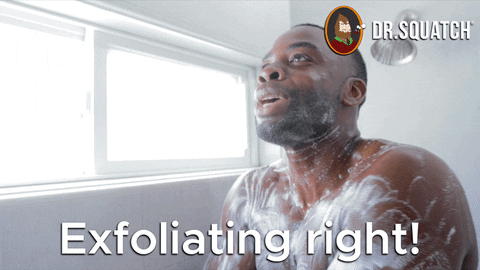 Giphy
GiphyI am a fan of DIY chemical peels; so much so that I wrote an entire article about it a couple of years ago (check out “I've Been Doing At-Home Chemical Peels. Here Are The Pros And Cons.”). The things that I like most about them are they are a super-effective way to exfoliate and even out my skin tone. That said, though, be careful with doing too much exfoliating whether it’s via a chemical peel, a skin scrub or even dry brushing.
Not only can over-exfoliating irritate your skin, it can dry it out, cause lots of skin flakes, lead to inflamed skin — and all of this can result in hyperpigmentation as your skin is in the process of “getting back to normal.” So, just how often should you exfoliate? Unless your skin is really oily, 1-2 times a week is more than enough (2-3 if it is on the oily side).
Layering with Too Many Products
 Giphy
GiphyOh, I know — if you watch too many of those TikTok and Instagram videos where women are applying 6-10 products on their face before adding any make-up to it, it can tempt you to follow suit. Use some caution with that, though. Each skincare product comes with its own list of ingredients and every time you add something else that has another set of ingredients onto it, that increases the chances of you irritating your skin or causing it to break out.
My two cents would be to ease into each product. Start with one thing and, if it’s all good (after about a week or so), incorporate another. Oh, and try to keep it down to 3-5 skincare products tops. When it comes to effective skin routines “less is more” is a motto to live by. Otherwise, redness, flaking and hyperpigmentation may be in your future.
Using Skincare Products That Contain Fragrance
 Giphy
GiphyAlthough applying skincare products that have a nice scent to them can cause your skin to smell amazing, sometimes they can be both an irritant as well as an allergen — and that can cause your skin’s barrier to weaken or become really irritated. And again, whenever your skin is damaged in some way, the recovery process can lead to hyperpigmentation. So, it really is best to avoid scented skin products at all costs (if you want flawless skin, that is).
Applying Too Much Heat
 Giphy
GiphyBet you didn’t see this one coming. How about increased blood flow, over time, can lead to hyperpigmentation. Basically, it’s because of the fact that, sometimes, too much consistent blood flow can result in skin inflammation and, as we already discussed, when the body is healing from inflammation, that can sometimes cause hyperpigmentation to occur.
The takeaway here: use sunscreen when you’re outdoors and try to keep those scorching hot showers to a minimum. Being in warm water for between 7-10 minutes is ideal.
Not Testing Products (Especially Acids) on Your Arm First
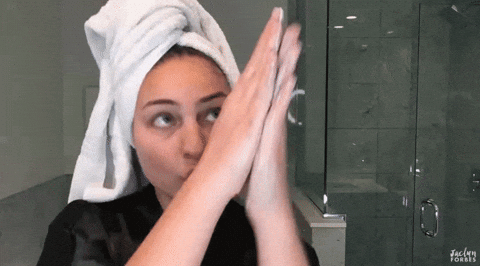 Giphy
GiphySomething that definitely keeps my skin glowing is certain acids: hyaluronic acid, mandelic acid and kojic acid soap (oh and some vitamin C extract too), especially. All of these are pretty good on darker skin tones; however, because we all are different, before applying any acid to your skin, make sure to test it on your arm first (and wait 48 hours, just to be sure that the coast is clear).
Trust me, I know of what I speak because I once tried some pretty potent pineapple extract on my face once and it mildly burned the lower part of my right cheek to the point where it took about four months before everything turned back to normal. Hmph, if I can keep anyone from experiencing that drama, I absolutely will.
7. Experimenting with Harsh Essential Oils
 Giphy
GiphyListen, if you want a zit to go away, damn near overnight, apply some tea tree oil to it. Just make sure that you dilute it with a light carrier oil (like grapeseed, jojoba or rosehip oil) first. Why? Oh, I have learned from very up close and personal experience that certain essential oils can also burn your skin and, as we’ve already discussed, ad nauseum at this point, damaged skin typically results in hyperpigmentation on some level. Yeah, essential oils are a blessing. They are also nothing to play with. Dilute, dilute, DILUTE.
___
You know, they say that it can take several weeks, if not many months, for hyperpigmentation to totally fade away. Hmph. To me, that’s even more incentive to do all that you can to avoid it transpiring in the first place — and that includes NOT incorporating counterproductive skincare routines and regimens.
The more you know, sis. For real.
Let’s make things inbox official! Sign up for the xoNecole newsletter for love, wellness, career, and exclusive content delivered straight to your inbox.
Featured image by Shutterstock



